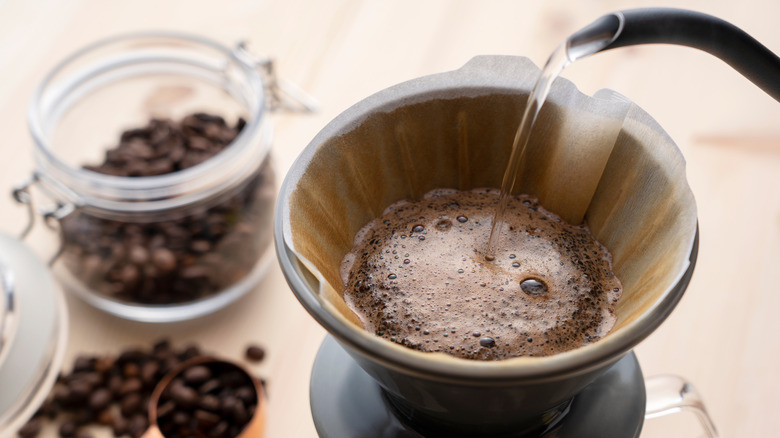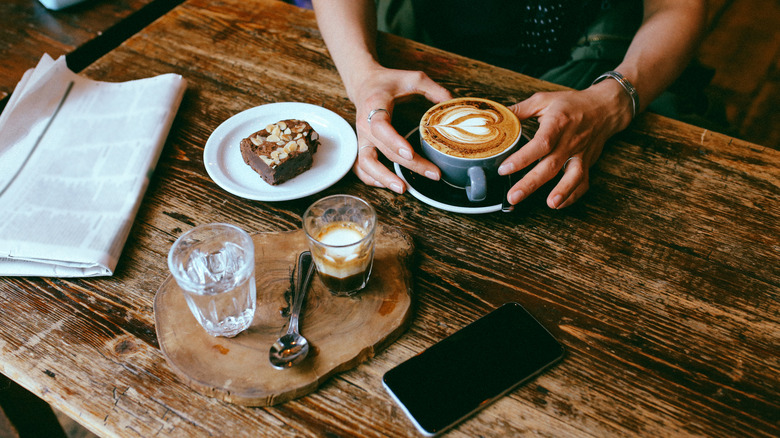Why Quality Water Matters When It Comes To Brewing Coffee
In the world of food and drink, water is often considered a diluting agent that diminishes other flavors. However, water itself has a taste, and when it comes to brewing coffee, it plays a significant role in determining the final flavor of your brew. Despite being a caffeine-laced, olfactory powerhouse, the coffee beans themselves rely on water to activate and extract their flavors. If the water used to make your cup of joe is too hard, acidic, or alkaline, it can cause an imbalance that fundamentally alters the taste of your beverage.
Before you invest your hard-earned cash into the hottest, newest brewing system, upgrade to a top-of-the-line burr or blade coffee grinder, or pull out your hair trying to find a grinder setting that will make coffee taste better, take it back to the basics. Checking and improving your water quality doesn't have to be expensive or complicated, and ensuring you're using quality water will allow you to fully appreciate the intended smell, taste, and body of your beans.
How water quality impacts your coffee's flavor
Tap water can vary from one region to another, and even from day to day, based on its source and how a municipality treats it before sending it to local faucets. Some key variables that often fluctuate include its mineral content, pH level, and total dissolved solids (TDS) — all of which play a role in determining the flavor of your coffee.
High mineral content usually refers to concentrated levels of calcium and magnesium in the water, but can also include iron, zinc, and barium. Total dissolved solids represent other compounds commonly found in water. Both contribute to what is colloquially known as hard water. When hard water is used to brew coffee, it rapidly extracts the coffee from the grounds and gives more caffeine and body, but it also causes bitterness in your cup of joe, and can damage your coffee machine. Conversely, water with low mineral content, or soft water, will extract less from the grounds and have a milder taste, less caffeine, and more prominent acidity.
Your water's pH describes how acidic or alkaline it is, which impacts how quickly coffee is extracted as it brews. While many buy into the myth that alkaline water is healthier for you, there is no research to support this claim, and it could leave coffee tasting weak. On the other side of the spectrum, too much acidity in water can cause rapid, excessive coffee extraction, making it taste bitter and harsh.
How to improve your water and optimize your coffee
So, what constitutes good quality water when brewing coffee? According to the Specialty Coffee Association, the ideal water hardness range is 50-175ppm, or anywhere above the low end of "soft," and below the "very hard" classification. Your coffee won't be detrimentally impacted if you steer clear of extreme levels. The optimal water pH for brewing is 7, but anywhere between 6-8 is acceptable. These levels will allow for a steady, consistent release of coffee that gives the caffeine, body, and flavor your beans have been blended and roasted to deliver, without inadvertently skewing the flavor in a less desirable direction.
To check where your water falls in relation to these guidelines, you can buy home testing kits that include tools like pH and water hardness strips. If your levels aren't ideal, you can also invest in mineral kits and distilled water to create the perfect water for brewing coffee. But for most coffee drinkers, using a basic, run-of-the-mill water filter will deliver the results they're looking for. Since these are pretty easily accessible, it seems like the perfect place to start.



